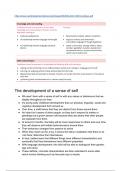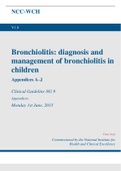https://www.cambridgeinternational.org/Images/502932-2021-2023-syllabus.pdf
The development of a sense of self
● We aren’t born with a sense of self or with any values or behaviours that we
display throughout our lives
● It's during early childhood development that our physical, linguistic, social and
cognitive development form around us
● Over time, a child learns that they are distinct from those around them
● An infant isn’t aware of other people, so they don’t respond to smiles or
greetings but a grown person will because they are aware that other people
are separate from them
● At around 2 months, the baby will be more responsive to others and over time
they will observe and imitate behaviourisms around them
● Their behaviour changes from passive to active
● When they reach out for a toy, it shows the baby’s realisation that there is an
‘out there’ distinctive from themselves
● In time, babies learn that different things have different characteristics and
eventually that they themselves have different properties
● With language development, the child will be able to distinguish their gender,
age and name
● These definite, concrete characteristics are then extended to some skills
which involve thinking such as favourite toys or books
, ● Later, children are able to describe their character, likes and dislikes and then
they can form a judgement about behaviour and moral issues such as good or
bad
● Our self-identity changes throughout our lives as it is influenced by
experiences and interactions with those around us
● Jean Piaget labelled that preschool children have the inability to take the
perspective of others into consideration (the egocentric phase)
● Cognitive development is about the development of information-processing
skills in the brain
● These concern processing information, memory, perception and learning
languages
● Cognitive and motor developments are thought to be linked, as physical motor
coordination is necessary to be able to understand concepts
Self: an individual’s separate existence from others
Early childhood development: the physical, emotional, cognitive and social
development which takes place from birth until primary school years
Self-identity: an individual’s awareness of their own characteristics in relation to the
social groups around them
The influence of language on self-identity
What role does language play in our sense of self-identity?
Idiolect:
● The distinctive pattern of an individual’s speech
● Your voice is a recognisable part of you
● Reflects identity
Sociolect:
● The style of speech shared by people in a particular region or social group
● The form of language you speak
● Creates identity
Other ideas:
● The influences of your gender, age, ethnicity, religion, family and friends,
education, work, and social patterns are linked with the language you use to
live your life and maintain your self-identity
● Language may be important to maintain your group identity, such as when a
minority language is threatened
● Most of our lives are spent in the company of other people and there is a
close link between ourselves and other people in society
● We are affected by the attitudes and behaviours of others, which is expressed
through language, the language others use can play a significant role in
shaping our self-identity
● The language and strategies we adopt have a considerable effect on our
sense of self
, Conversational maxims
innateness and learning
behaviourism, innatism, nativism, empiricism
Behaviourism:
● Acquisition of the sense of self takes place alongside the acquisition of
language
● Behaviourism is a theory of learning based on the idea that all behaviours are
acquired through conditioning, and conditioning occurs through interaction
with the environment
● Behaviourists believe that our actions are shaped by environmental stimuli
● States that the development of the mind, and also language, sprang directly
from the child’s observation and imitation of those who are around them
● All thoughts and emotions are explained in terms of encouraging desired
behaviour (speaking and discouraging unwanted traits)
● The behavioural theory also says that only observable behaviour should be
studied, as cognition, emotions, and mood are far too subjective.
● John Watson’s research (1913) was developed by Skinner
Empiricism:
● Our sense of self-identity and our knowledge of language come through our
senses and experiences and not through any reasoning or logical arguments
● If you don’t experience it, you can’t use language to express yourself
● The theory was advanced by John Locke in 1690
● He argued that at birth everyone is a ‘clean slate’ in which all experiences
developed
● He denied that humans had any innate ideas and believed that ideas and
language develop through experiences
● This understanding of gaining knowledge through experience became the
basis of the scientific approach
Innatism:
● This theory says that there is something special about the human brain which
enables humans to master the complexities of language
● This idea goes against the idea of empiricism
● Traditionally, innatism refers to the philosophy of Plato and Descartes who
believed that ideas were in the mind since birth and given by a supreme being






